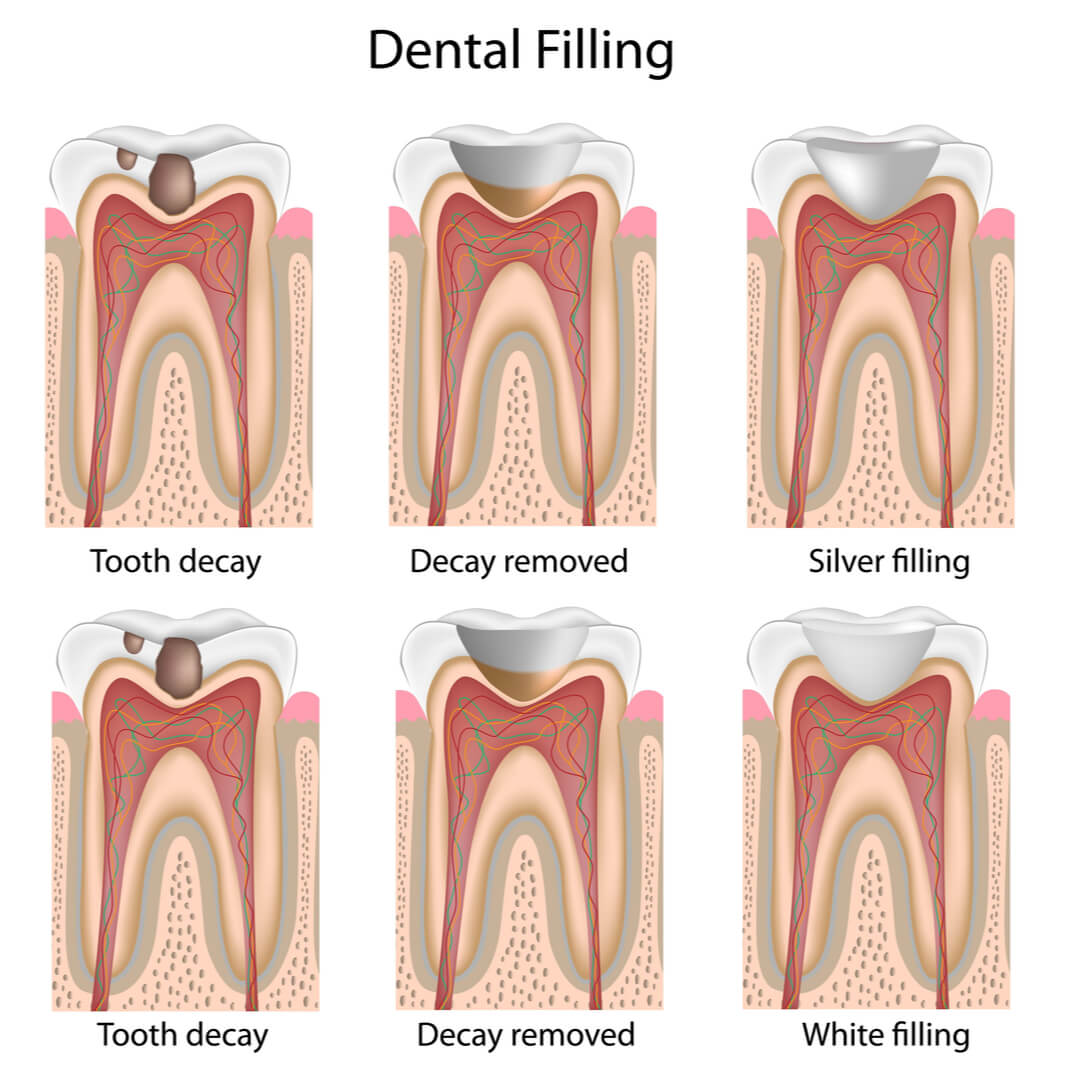Cavities are holes in the enamel of your teeth that form when acid eats away at the outer level of your teeth. The best treatment for cavities are dental fillings.
If left untreated, the cavities can grow and begin to affect the inner tissues of your teeth. As a result, cavities can cause nerve pain, toothaches, hot or cold sensitivity, enamel stains, and pain while eating.
In order to repair a cavity, a dentist has to remove the decaying enamel and then fill the hole with special material. There are several types of fillings available. At AC Dentistry, we offer both amalgam and composite fillings.
There are several things that cause cavities, including drinking soda and other sugary drinks, eating processed sugary foods, and not taking care of your teeth.
If you’re worried about a cavity for your child, visit one of our four convenient locations across Middle Tennessee. Visit us in Goodlettsville, Mt Juliet, downtown Nashville, and our new office in Bordeaux.
Amalgam Dental Fillings
The word “amalgam” means “mixture or blend,” and so an amalgam filling is made of a mixture or alloy of metals. Usually, amalgam fillings are a silver color and are usually made with liquid mercury and another powdered metal alloy containing copper, silver, and tin.
Because amalgam fillings are made from a mix of metals, they are actually cheaper and more durable than composite fillings.

Are Amalgam Fillings Safe?
Since these types of fillings contain liquid or elemental mercury, people often ask if dental amalgam fillings are safe. The short answer is yes. The FDA has found that the amount of mercury in the filling does not pose a risk to the people that have them.
Mercury is a liquid metal at room temperature, and when mixed with the alloy, it binds to the healthy enamel. The side effects of mercury come from exposure to a large amount of mercury fumes. The minimal amount of mercury in a silver filling has made them safe for human use.
How Long do Amalgam Fillings Last?
Due to the metallic makeup of a silver filling, they usually last for about 10 years at least and 15 years at the most. If your child has a cavity in their baby teeth, they may benefit from a filling.
It is important to note that silver fillings may darken over time, so if cosmetic appearance is important to you or your child, an amalgam filling may be the right choice.
What are the Risks of Amalgam Fillings?
One of the biggest concerns around amalgam dental fillings is whether or not they are safe. The concern centers around the use of elemental mercury in the silver alloy. However, the FDA and the American Dental Association (ADA), both agree that there is little to no scientific evidence that mercury-based fillings cause health problems.
Other risks that come from getting dental fillings include:
- Mouth injuries
- Reactions to anesthetic
- Additional cavities
- Increased sensitivity
These complications are rare because of the training and practice that most dentists have. If you do experience any of these side effects, talk with your dentist, or you may want to see an oral surgeon.
Composite Dental Fillings
Similar to an amalgam filling, composite fillings are a mix of ground porcelain or ceramic material and clear resin. This results in a more natural-looking filling that matches your tooth color.
The disadvantage of composite fillings is that they are not as durable or long-lasting amalgam fillings. Typically, composite fillings only last for about five years. They are also more expensive and take more time to place and cure than amalgam fillings.
On the plus side, composite fillings form a closer bond to the tooth enamel. The tighter bond then reduces the risk that cavities will develop around the filling. The composite also does not conduct temperature as well as a silver filling does. Therefore, if your teeth are more sensitive, you may benefit from a composite filling.

How do I get a dental filling?
The first step is knowing if you need a filling. If your dentist sees a large cavity during your appointment, they may recommend you get a filling. If you are worried about a cavity, pay attention to any tooth pain or sensitivity you have and ask your dentist.
When you go in to get a filling, your mouth will be numbed with a small dose of anesthetic. Next, the decaying material is removed by your dentist with a drill or other instrument. Once the dead enamel is removed, the area is cleaned and the filling will be set.
Whether it is an amalgam or composite filling, a small UV light is used to cure the filling and bind it to the tooth. Your dentist will give you specific instructions after the filling sets. Most of the time, they will recommend chewing on the opposite side of your mouth in order to give your mouth time to heal.

Other dental filling options
If you would like a more permanent solution for dental fillings, there are other options. However, at AC Dentistry we only offer amalgam and composite fillings.
These other two options are glass ionomer and gold fillings.
Glass ionomer fillings are made with special glass and acrylic materials. Usually, these are only used for fillings below the gum line, but also for small children. These fillings are about on-par with composite fillings in terms of cost and durability. An added advantage they have is that they release fluoride over time. These can be an excellent option for younger baby teeth that will eventually fall out.
Gold fillings are the most durable type of fillings. Usually, they will last anywhere between 15 and 30 years. Baby teeth are not good candidates for gold fillings since they will fall out eventually. Gold fillings are also the most expensive type of dental fillings and are usually for adults.
How do I prevent cavities?
If you want to prevent cavities for yourself or for your child, the most reliable way is to practice good dental hygiene habits and pay attention to what you eat.
Certain foods and drinks will cause more plaque to build up on your teeth. With more sugary material, your mouth bacteria will feed off of it and produce acid. In order to prevent tooth decay, you must brush and floss your teeth.
Brushing and flossing will dislodge plaque and bacteria from your teeth and gums. Mouthwash can kill oral bacteria, but some formulas are better than others.
The most effective way to prevent cavities is to reduce or limit you or your child’s sugar intake. If your family eats breakfast cereals and granola bars often, read the label and determine a limit. Be aware of sugary beverages like soft drinks, but also sugar-sweetened beverages like sports drinks, lemonades, or juices.
Setting limits for your sugar intake will not only help you reduce cavities but also risks for heart disease and weight gain.
The biggest benefit of regular dental care for your child is teaching them life-long good dental habits. Starting these habits young will do wonders to help your child keep their teeth healthy throughout their life.
Regular visits will help prevent progressive problems like gingivitis, tooth decay, and cavities. And the better your child takes care of their teeth, the more they can avoid getting fillings. Even later on, good dental habits can reduce the need for root canals and other dental surgeries.

What are the advantages of pediatric dentistry?
Getting your child’s dental care done with a pediatric dentist has many benefits. As pediatric specialists, we received two or three more years of training than other dentists. Our training helps us set a comfortable dental experience for children, as well as work with children that have special needs.
Book an appointment
If it’s time to get your child’s cavity filled, you can set up the appointment right here on our website. Don’t wait! The sooner you get your child’s teeth taken care of, the easier it will be.
